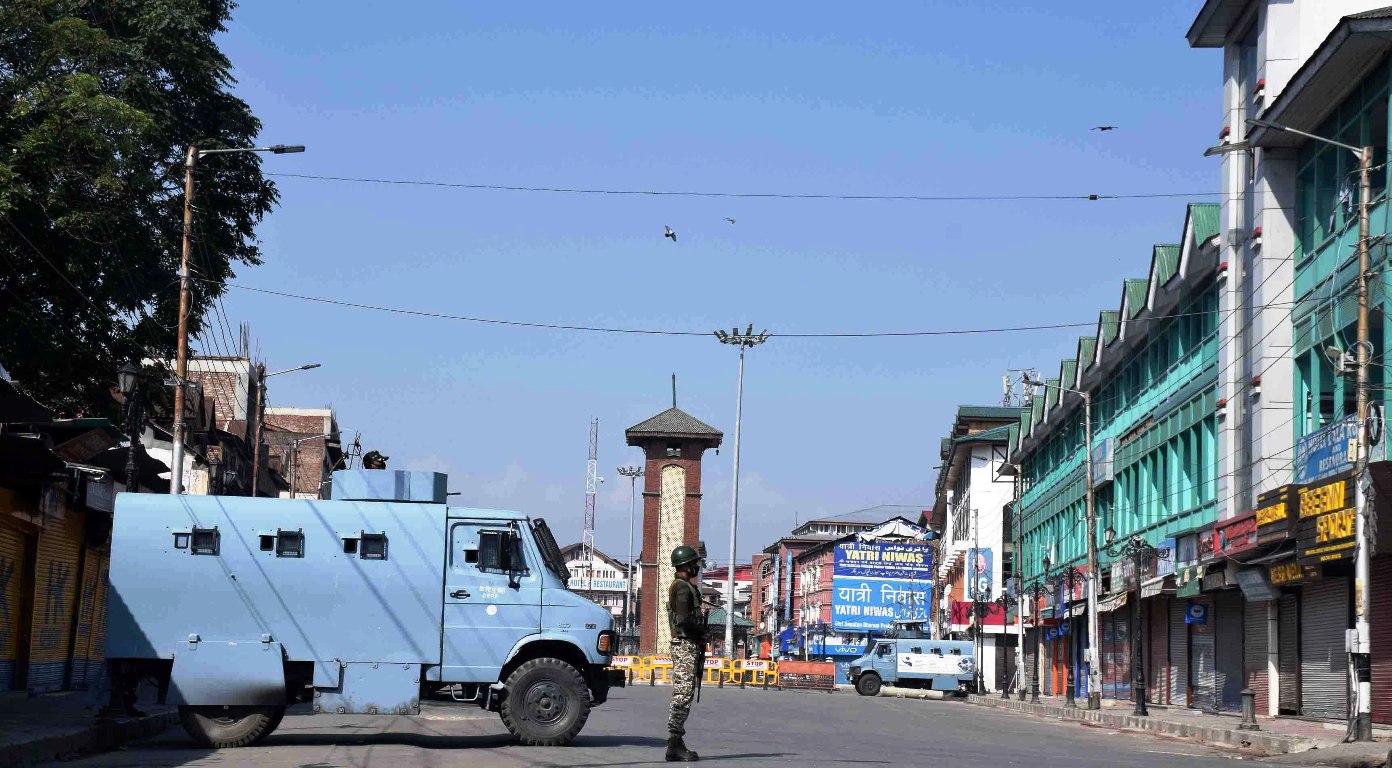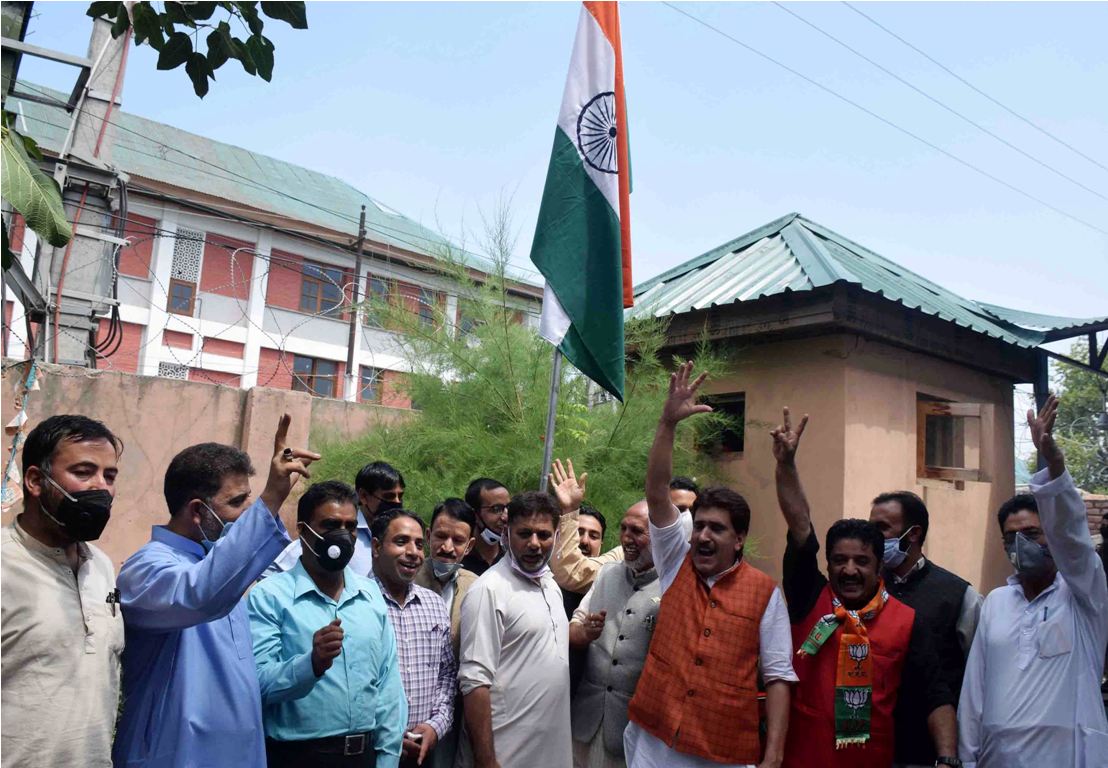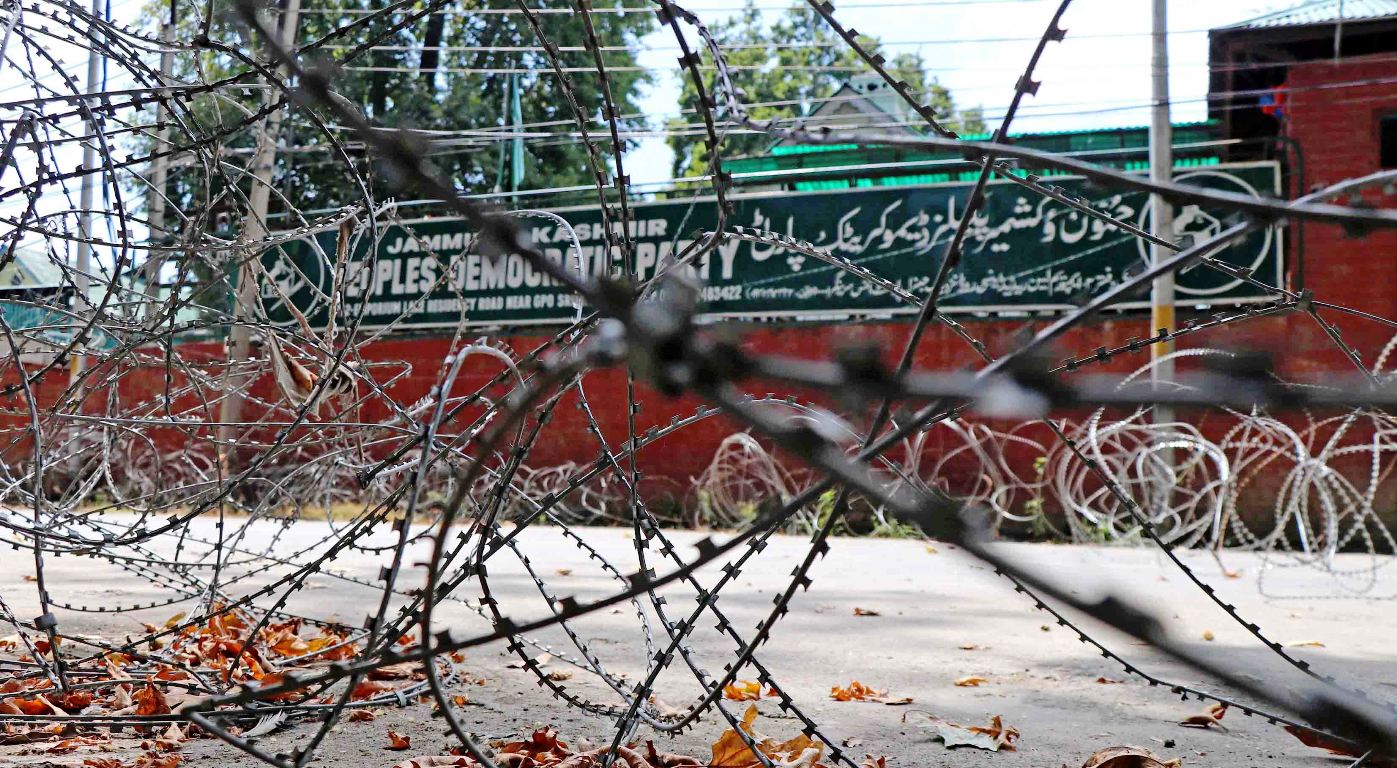SRINAGAR: The media across the world commented on the situation in Kashmir, a year after the Article 370 was abrogated. In this collection, we are reproducing some of the editorial comments that appeared in the major newspapers in India.

Paramilitary men stand guard in Srinagar’s deserted Lal Chowk on the first anniversary of abrogation article 370 Wednesday, August 5, 2020. KL Image: Bilal Bahadur
Year Gone: Communication Collapse In Kashmir
Telecommunications and internet services have been restored, but only 2G bandwidth deeply affects almost all-important activity, from online classes to businesses
The Telegraph, Kolkata
August 5, 2020
One year is time enough to judge whether a new dawn has come. This was a promise the prime minister made when the Centre revoked Jammu and Kashmir’s special status and statehood, and turned the region, without a word to its people or their leaders, into two Union territories on August 5, 2019. The prime minister’s happy tweet had also declared that Jammu and Kashmir would henceforth be free of shackles. True, there has been little stone-throwing since then. But violence persists: in 2020 so far 17 civilians, 34 security people and 154 extremists have been killed, the last comparable count being in 2012. The unshackling is mysterious: over 20 politicians from all parties remain either in jail or under house arrest. This includes former chief ministers and, although Farooq and Omar Abdullah were released in March after seven months of incarceration under the Public Security Act, Mehbooba Mufti’s confinement has been recently extended by three months. Evidently the Centre is not eager for political discussions with leaders of the region, even with those who are in favour of the Bharatiya Janata Party. This is rather puzzling in a federal republic. Since the Supreme Court is yet to hear the cases that would decide the constitutionality and legality of the government’s act, the new dawn remains foggy.
Telecommunications and internet services have been restored after a long suspension, but since internet is only of 2G bandwidth and not 4G, almost all important activity, from online classes to businesses, have been deeply affected. The new media policy decides on the news to be beamed, for the Centre cannot stand ‘fake’ news, while the heavy presence of security personnel and repeated curfews — a fresh one is in place till August 8 — perhaps help Kashmir in some unfathomable way. Apparently the crippling of the economy and of education — to mention just two areas of serious damage — do not make Kashmir less ‘normal’, a claim the Union government is fond of making. But it cannot be argued that the situation imposed on the region is democratic. The abrogation of special status is not the issue — that can be debated — the problem lies with the features that have accompanied it, including the revocation of statehood. India’s democratic fabric has been undeniably damaged; repairing it depends as much on the government as on the people of the country.
Next, In The Valley
A year ago, J&K changed irreversibly. Restoring rights, democratic politics, people’s voice are key to road ahead
The Tribune, Chandigarh
August 5, 2020
The lockdown imposed on August 5 last year has segued into a second lockdown, induced by the COVID-19 pandemic.
A year after the BJP-led NDA government made Article 370 redundant, withdrew the special status of Jammu & Kashmir, and bifurcated the state into two Union territories, the fait accompli has seeped in. The Union territory of J&K may become a state again, but there will be no turning back the clock on Article 370. For the BJP, it was the fulfilment of a long-standing ideological promise to “integrate” the Muslim-majority state with the rest of the country. By all accounts, the move has been met with acquiescence, if not support, across the country — no national political party has prominently protested the Centre’s move, nor any regional parties outside J&K. In the past year, there has been no visible outpouring of protest in J&K, no major militant strikes.

Bhartiya Janta Party Kashmir celebrate one-year completion of abrogation of article 370 and 35A at party headquarter Jawahar Nagar in Srinagar on Wednesday 5 August 2020. KL Image: Bilal Bahadur
That does not mean, of course, that the seven-decade-old problem has been resolved or that the people have accepted the changes imposed on them. The reality is, they have not yet been allowed to express themselves through institutions of representation or governance. Indeed, what began as a departure from democratic norm — the NDA government decided on the state’s future by cutting out the people, their political leaders and even the BJP’s own allies — has played out over the year in the imprisonment of political leaders and hundreds of others, effectively erasing the degrees of difference between the mainstream and separatists and those in between. Curbs on the press, routinely calling journalists to the police station, deepen the distrust.
While many leaders have been released since, the detention of former chief minister Mehbooba Mufti under the Public Safety Act has just been extended by three months and many others continue to be in official and unofficial detention. The lockdown imposed on August 5 last year has segued into a second lockdown, induced by the COVID-19 pandemic. Even though 2G has been restored, the unavailability of high speed internet has made life and work difficult, for businessmen who need to communicate with partners outside the state, for those applying for jobs and college seats, to those trying to download information on the pandemic. Students, too, have suffered. There is an air of uncertainty. Militancy continues — local young men are easy recruits even as cross-border infiltration has come down.
Except for the decision to make new domicile rules in keeping with the abrogation of 35A that defined “permanent residents”, and the delimitation exercise, the government has appeared unclear on a roadmap ahead.
It should be clear to it that the continuing political vacuum in the Valley can only cause damage. There is a limit to how much, or how long, panchayats from a flawed election can be propped up in place of an elected Assembly. Though the Election Commission took exception to his comments, Lieutenant Governor G C Murmu was right in saying that elections could follow the completion of delimitation. The government must expedite the restoration of political processes in J&K. It must release Mehbooba Mufti and others who are still in detention. It must restore all freedoms guaranteed under the Constitution, including the right to free speech, which in this day and age, includes access to the Internet. Most importantly, it must set the stage for the people to elect their representatives.
J&K, A Year Later
Free political prisoners, allow voices of dissent
The Indian Express, Delhi
August 5, 2020
Today marks a year since Jammu and Kashmir was stripped of its special status and reorganised into two UTs. In one stroke, an assertive BJP claimed, a solution had been found to the Kashmir imbroglio and the stumbling block to the integration of the Valley removed. The jubilation in the rank and file came as no surprise. What did was the overwhelming sense of endorsement in the rest of the country. How Kashmir and the Kashmiris felt mattered little. And, apparently, still does not. Jammu was ecstatic, initially at least. Having read the fineprint, the apprehensions are far from muted. Ladakh felt it had gained freedom from the stranglehold of distant and uninterested administrators. The slow pace of change is testing its enthusiasm.
The non-BJP parties did show a semblance of resistance, but quickly realised the power of silence in the changed climate of burning patriotism and nationalism. Omar Abdullah has been scathing in his attack, saying he felt betrayed more by the Opposition. What deserves serious attention is his charge against the Modi government of reducing the political mainstream into an object of ridicule. Four-time legislator MY Tarigami’s argument is pertinent: ‘The continued detention of political prisoners, particularly legislators, shows that if democratic rights are not even available to the voices that speak on behalf of the Indian union, how would ordinary people even think of enjoying them?’ The only fallout of disallowing political discourse is anger, sullenness and further alienation, not integration.
Since the clampdown in the Valley last year, high-speed Internet remains out of reach. That amounts to two lockdowns, including the one induced by Covid-19, without a basic necessity. Carrying out such an exercise anywhere else in India is unimaginable. The legal challenge to the abrogation of Article 370 is still on, restoration of statehood is a popular demand. Allow voices of dissent. Dispel the notion, as a former CM feels, that all the Centre wanted to do on August 5, 2019, was to ‘punish and humiliate’ the people.
In Kashmir, Integrate Kashmiris
The national project is complete. The democratic project now needs work
Hindustan Times, Delhi
August 4, 2020
It has been a year since Parliament changed the constitutional status of Jammu and Kashmir (J&K), effectively nullifying Article 370, and reorganising the state into two Union territories of J&K and Ladakh. This newspaper supported the quest for integrating Kashmir with the rest of India, constitutionally and legally, with the dilution of Article 370 — while raising questions about the process followed to achieve it, and emphasised the need for outreach to the Kashmiri people.

People Democratic Party Headquarter behind the concertina barricades on 5 August 2020. The party hadsaid it would protest the abrogation. KL Image: Bilal Bahadur
A year later, there is little doubt that the entire constitutional, legal and administrative rejig of J&K has cemented the control of the State over the territory. It has armed Indian security forces with greater room to tackle Pakistan-sponsored terrorism and crack down on violence. And it has shown the futility of the “azaadi” slogan of those who harbour ambitions of secession. At the same time, the challenge of integrating Kashmiris with the Union persists. The detention of mainstream leaders, the curtailment of civil liberties, including mobility and connectivity, and the restrictions on political activity (all of which this newspaper has consistently opposed) has left the Kashmiri street alienated. The dilution of statehood has been met with hostility. There has been tremendous disruption to the everyday lives of people.
The government must note these sentiments and not brush aside the democratic dissent of citizens, even as it battles the violence. Restoring democracy fully — by removing restrictions on connectivity, releasing detained leaders, initiating a political dialogue, making security forces more accountable for excesses — and restoring statehood to J&K (while keeping Ladakh as a separate unit) is the best way to restart the political process. Kashmir has been won over, now win over the Kashmiris.
The post What The Newspapers Say A Year After The Abrogation Of Article 370? appeared first on Kashmir Life.
from Kashmir Life https://ift.tt/2ET91Js
via IFTTThttps://kashmirlife.net
No comments:
Post a Comment